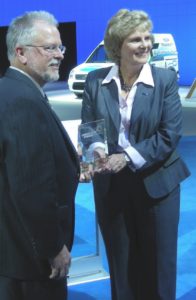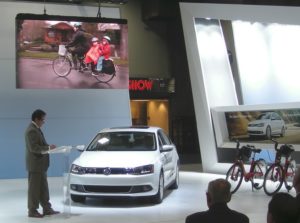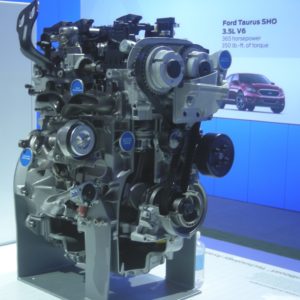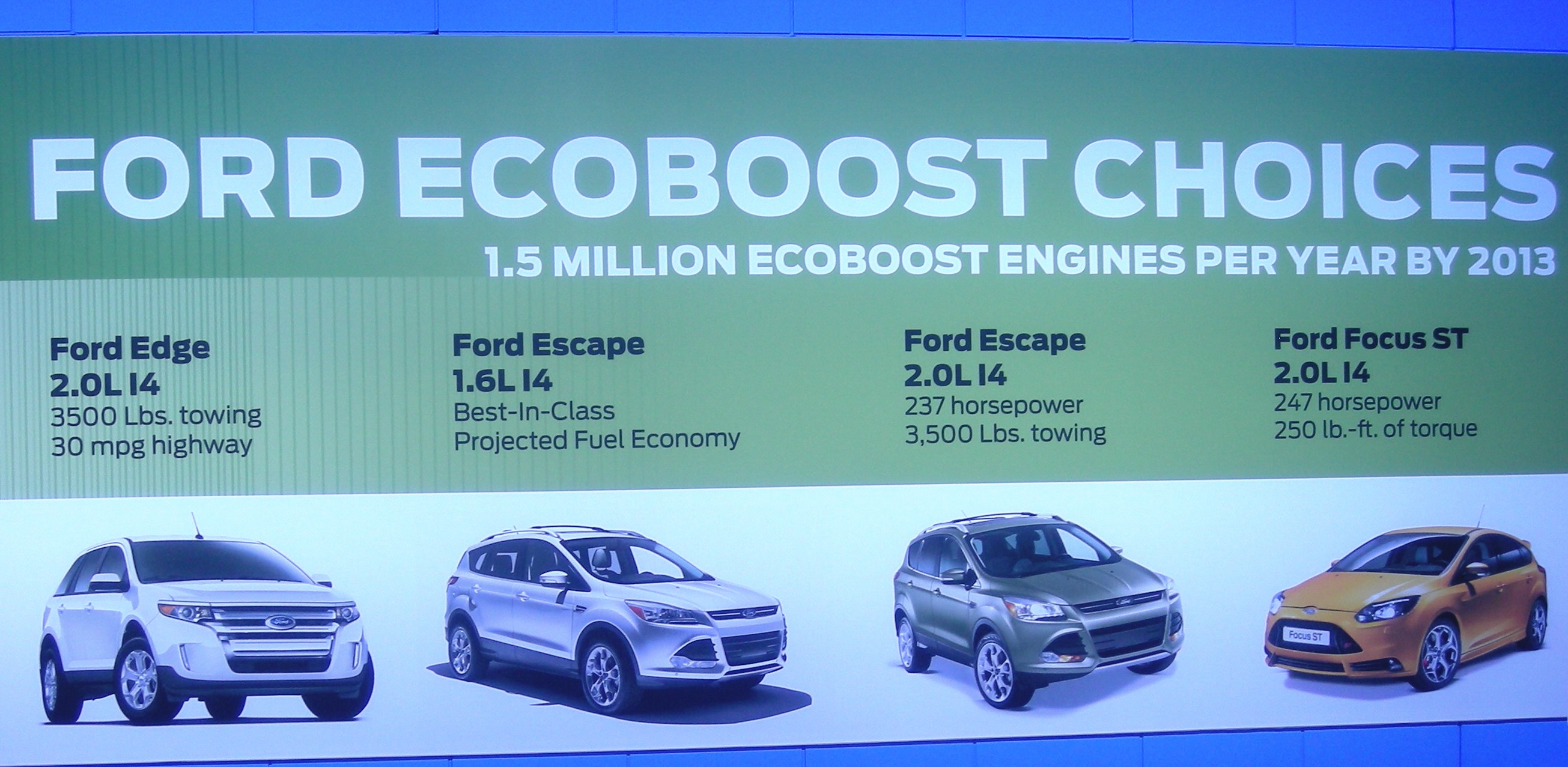 by Robert Kozak (Advanced Biofuels USA) On the day before the Washington DC Auto Show opens to the public, there is an event called Policy Day. Administration officials and high ranking auto company executives give short presentations and spend time taking questions from the media. Policy Day is a good way to hear from “everyone that counts” in a short period of time. It is also informal enough that you can spend some “off-the-record” time with them as well.
by Robert Kozak (Advanced Biofuels USA) On the day before the Washington DC Auto Show opens to the public, there is an event called Policy Day. Administration officials and high ranking auto company executives give short presentations and spend time taking questions from the media. Policy Day is a good way to hear from “everyone that counts” in a short period of time. It is also informal enough that you can spend some “off-the-record” time with them as well.
Policy Day is also good exercise. The auto show uses two large halls in different buildings of the Walter Washington Convention Center. Twelve presentations are made at twelve different locations. Wear good walking shoes.
Here are some sketches on biofuels, electric cars, Administration policy, and the new “color of the year” gleaned during Policy Day.
 Assistant Secretary of Energy for Policy and International Affairs, David Sandalow speaking at the DC Auto Show Policy Day.
Assistant Secretary of Energy for Policy and International Affairs, David Sandalow speaking at the DC Auto Show Policy Day.
View from the Obama Administration on Biofuels
The Administration sent three representatives: Secretary of Transportation, Ray La Hood; Assistant Secretary of Energy for Policy and International Affairs, David Sandalow; and Margo Oge, EPA Director of the Office of Transportation and Air Quality.
With 2012 being an election year all the Administration speakers focused on the same talking points. Obama saved the auto industry. Obama saved the economy by saving the auto industry. And America will be driving “zero-emission” electric cars to meet the proposed 2025 fuel economy goal of 54 mpg. The role of biofuels you might ask?
DOE Assistant Secretary David Sandalow’s presentation started with the “Obama saved the auto industry” boilerplate and segued into how the Department of Energy was critical to that success. He talked about DOE’s work with low temperature combustion and light weight materials and the jobs being created by battery factories funded with DOE grants and loans. (While he was speaking on January 26th, Ener1 Inc., a battery manufacturer that had received $118 million in DOE grants was filing for bankruptcy.) He then explained that the new cornerstone of Obama’s energy policy, cheap natural gas, which the President focused on in his State of the Union Address, was only possible because of the fracking technologies that had been developed with DOE research and funding. When his talk was finished, the word biofuel had still not been uttered.
 In the Q&A session he was asked if the absence of biofuels in his presentation meant a policy change or was it an oversight? Sandalow quickly said it was an oversight, no policy had been changed and that advanced biofuels were “very important.” I hope the DOE speechwriters remember that in the future.
In the Q&A session he was asked if the absence of biofuels in his presentation meant a policy change or was it an oversight? Sandalow quickly said it was an oversight, no policy had been changed and that advanced biofuels were “very important.” I hope the DOE speechwriters remember that in the future.
Natural Gas Cars are Back
Honda, always a cutting-edge company, showed they understand which way the wind is blowing in the Obama Administration.
Blue is the New Green
Many articles about the zeitgeist of the 2012 election campaign, as well as the Occupy movement, have noted that “green” isn’t IN anymore. Apparently the focus groups used by some of the automakers delivered the same message. Three manufacturers that formally touted their commitment to the environment; VW, Mazda, and Hyundai used the color Blue to describe their formerly green initiatives.
Perhaps the weirdest presentation was that of VW. Instead of focusing on the greater use of the very fuel efficient TDI diesel technology in cars like the Jetta or the Tennessee manufactured CC, the US President of VW turned the presentation over to an organization called Bikes Belong Foundation. We were then told about the wonders of cycling, most of all the ability to stop child and teenage obesity. Somehow or another VW was going to contribute to making cycling safer and that was their new Blue strategy.
Being a cynical sort I had to ask a guy wearing a VW America badge if they were going to buy a bicycle manufacturer like Trek. He made a wry smile.
The Blue Oval is Still Green
 Green Car Journal's Ron Cogan presents the 2012 Green Car Vision Award for the C-MAX Energi to Ford's Sue Cischke.
Green Car Journal's Ron Cogan presents the 2012 Green Car Vision Award for the C-MAX Energi to Ford's Sue Cischke.
While some manufacturers would not even say the word green, the presentation at the Big Blue Oval, aka Ford Motor, was pure green. The theme of their presentation was a thank you and fond farewell to Susan Cischke, VP for Sustainability, Environment, and Safety Engineering who was retiring.
Cischke had been with Ford through the bad days and helped steer the company to its current rousing success. Without a US government bailout, in case President Obama forgot.
After the awards and thank you’s, Cischke took the crowd through Ford’s Green future. Not only did it include the expected electric and plug-in hybrids, but, by sheer numbers, it meant the Ecoboost engine. Readers of Advanced Biofuels USA know this technology gets the highest efficiency possible from light-weight small displacement internal combustion engines by applying a combination of turbocharging, direct fuel injection, variable valve and ignition timing, and computer controls.
Basically, this is an engine that would be at home in a Grand Prix racer or in a Le Mans prototype.
Ford is offering three different Ecoboost engines in everything from the F-150 pick-up to the Focus and they promise 1.5 million Ecoboost engines annually by 2013.
This is a massive sea change in what the general public thinks of as basic car engine.
Why is Ford doing this? The improved mileage needed to meet 2015 and 2025 fuel economy standards. Not only is the engine more efficient and powerful, but it is also lighter than the engine it replaces. Less weight means even a smaller engine and transmission can be used. This technology reverses the thirty year trend of heavier vehicles requiring even bigger, less efficient engines.
What does this mean for the advanced biofuel industry? The Ecoboost type engines attain their maximum efficiency at high compression ratios. To operate at high compression ratios requires high octane fuels. (Link to the article about engine design) Ethanol has an octane rating of over 102 while regular gasoline has an octane rating of 87. An E-30 mixture would meet Ecoboost engine requirements without losing mileage due to other properties.
EPA is proposing new fuel specifications this year that would apply to the new fuel economy regulations. They are referred to as “Tier 3 specifications.” Do not be surprised if you see automobile manufacturers, as well as other major players, in the near future calling for a new requirement that would include both a higher octane rating and a provision that it could be met with about 30 percent ethanol. Moving from 10 percent to 30 percent ethanol and assuring that the increase would come from non-food sustainable “total-biomass” ethanol would take advanced ethanol from being “vaporware” and turn it into a reality.
GM Runs Silent as Well as Deep
While Ford is spearheading the Ecoboost revolution and getting almost all the press, both good and bad, General Motors has been bringing their version, the Ecotec, to market in almost a stealthy manner.
GM quietly began to offer the engine as an option on the 2011 Buick Regal. It is now available in the 2012 Chevy Cruz, and by 2013 it will be offered in a number of Chevy and Buick models. By 2015 it looks like Ecotec will be as much of GM’s basic engine technology as the Ecoboost will be for Ford.
Parallel Universes
By this time on Policy Day I think you can see two different universes being presented. On one hand you have the Administration still adamant that electric cars are “zero-emissions” (Even if they are powered by coal or natural gas electricity?) and that 1 million Americans will be driving them by 2015 (Fewer than 8,000 Nissan Leafs were sold in 2011.).
On the other hand, you had some motor vehicle manufacturers saying electrics or plug-in hybrids were not in their plans to meet the 2025 fuel standards: Mazda and Hyundai; and other manufacturers focusing on advanced internal combustion engines after having spent loads of R&D money on electrics: GM and Ford.
This all came together in two presentations near the end of the day.
At the Mazda exhibit, after their spokesperson said they could meet future fuel economy standards without plug-in hybrids or electrics, a consultant with the international market research firm HIS showed some very telling graphs on sales trends.
The key points were:
1) people do not like hybrids, hybrid market share has fallen over the past three years to about 2 percent in 2011;
2) electric car sales did not meet goals anywhere worldwide in 2011 and the “1 million by 2015” goal that Obama set is going to be missed by a large margin;
3) significant fuel economy benefits are coming from people trading in large SUVs for smaller “Cross-Over” models; and
4) diesels are picking up sales in the US.
This was a clear picture of the “reality based” future.
Right after this presentation Transportation Secretary Ray La Hood assured everyone that 1 million Americans would be driving electric cars by 2015 and that battery manufacturing and the building of the smart grid needed to power the electric cars would be creating hundreds of thousands of jobs. This was a clear picture of the “political rhetoric based” future.
I thank the folks who put together Policy Day at the Washington DC Auto Show. I think I now have a much better idea on where the US automotive world is headed.
All photos by Robert Kozak.
WATCH VIDEO from NACS that contemplates how best to provide new fuels to the public; how greater mileage means fewer fill-ups and fewer trips to the inside of the convenience store.
NACS video looks at the future of fueling, giving viewers an insider’s perspective from the 2012 Washington Auto Show. “It is really where we see policy and technology meet,” said NACS Vice President of Government Relations John Eichberger. “For the convenience store industry, understanding where the auto industry is heading and how that combines with federal policy is critical to understanding what we need to plan to sell to our customers in the future.
Nearly 55,000 articles in our online library!
Use the categories and tags listed below to access the nearly 50,000 articles indexed on this website.
Advanced Biofuels USA Policy Statements and Handouts!
- For Kids: Carbon Cycle Puzzle Page
- Why Ethanol? Why E85?
- Just A Minute 3-5 Minute Educational Videos
- 30/30 Online Presentations
- “Disappearing” Carbon Tax for Non-Renewable Fuels
- What’s the Difference between Biodiesel and Renewable (Green) Diesel? 2020 revision
- How to De-Fossilize Your Fleet: Suggestions for Fleet Managers Working on Sustainability Programs
- New Engine Technologies Could Produce Similar Mileage for All Ethanol Fuel Mixtures
- Action Plan for a Sustainable Advanced Biofuel Economy
- The Interaction of the Clean Air Act, California’s CAA Waiver, Corporate Average Fuel Economy Standards, Renewable Fuel Standards and California’s Low Carbon Fuel Standard
- Latest Data on Fuel Mileage and GHG Benefits of E30
- What Can I Do?
Donate
DonateARCHIVES
- February 2026
- January 2026
- December 2025
- November 2025
- October 2025
- September 2025
- August 2025
- July 2025
- June 2025
- May 2025
- April 2025
- March 2025
- February 2025
- January 2025
- December 2024
- November 2024
- October 2024
- September 2024
- August 2024
- July 2024
- June 2024
- May 2024
- April 2024
- March 2024
- February 2024
- January 2024
- December 2023
- November 2023
- October 2023
- September 2023
- August 2023
- July 2023
- June 2023
- May 2023
- April 2023
- March 2023
- February 2023
- January 2023
- December 2022
- November 2022
- October 2022
- September 2022
- August 2022
- July 2022
- June 2022
- May 2022
- April 2022
- March 2022
- February 2022
- January 2022
- December 2021
- November 2021
- October 2021
- September 2021
- August 2021
- July 2021
- June 2021
- May 2021
- April 2021
- March 2021
- February 2021
- January 2021
- December 2020
- November 2020
- October 2020
- September 2020
- August 2020
- July 2020
- June 2020
- May 2020
- April 2020
- March 2020
- February 2020
- January 2020
- December 2019
- November 2019
- October 2019
- September 2019
- August 2019
- July 2019
- June 2019
- May 2019
- April 2019
- March 2019
- February 2019
- January 2019
- December 2018
- November 2018
- October 2018
- September 2018
- August 2018
- July 2018
- June 2018
- May 2018
- April 2018
- March 2018
- February 2018
- January 2018
- December 2017
- November 2017
- October 2017
- September 2017
- August 2017
- July 2017
- June 2017
- May 2017
- April 2017
- March 2017
- February 2017
- January 2017
- December 2016
- November 2016
- October 2016
- September 2016
- August 2016
- July 2016
- June 2016
- May 2016
- April 2016
- March 2016
- February 2016
- January 2016
- December 2015
- November 2015
- October 2015
- September 2015
- August 2015
- July 2015
- June 2015
- May 2015
- April 2015
- March 2015
- February 2015
- January 2015
- December 2014
- November 2014
- October 2014
- September 2014
- August 2014
- July 2014
- June 2014
- May 2014
- April 2014
- March 2014
- February 2014
- January 2014
- December 2013
- November 2013
- October 2013
- September 2013
- August 2013
- July 2013
- June 2013
- May 2013
- April 2013
- March 2013
- February 2013
- January 2013
- December 2012
- November 2012
- October 2012
- September 2012
- August 2012
- July 2012
- June 2012
- May 2012
- April 2012
- March 2012
- February 2012
- January 2012
- December 2011
- November 2011
- October 2011
- September 2011
- August 2011
- July 2011
- June 2011
- May 2011
- April 2011
- March 2011
- February 2011
- January 2011
- December 2010
- November 2010
- October 2010
- September 2010
- August 2010
- July 2010
- June 2010
- May 2010
- April 2010
- March 2010
- February 2010
- January 2010
- December 2009
- November 2009
- October 2009
- September 2009
- August 2009
- July 2009
- June 2009
- May 2009
- April 2009
- March 2009
- February 2009
- January 2009
- December 2008
- November 2008
- October 2008
- September 2008
- August 2008
- July 2008
- June 2008
- May 2008
- April 2008
- March 2008
- February 2008
- January 2008
- December 2007
- November 2007
- October 2007
- September 2007
- August 2007
- June 2007
- February 2007
- January 2007
- October 2006
- April 2006
- January 2006
- April 2005
- December 2004
- November 2004
- December 1987
CATEGORIES
- About Us
- Advanced Biofuels Call to Action
- Aviation Fuel/Sustainable Aviation Fuel (SAF)
- BioChemicals/Renewable Chemicals
- BioRefineries/Renewable Fuel Production
- Business News/Analysis
- Cooking Fuel
- Education
- 30/30 Online Presentations
- Competitions, Contests
- Earth Day 2021
- Earth Day 2022
- Earth Day 2023
- Earth Day 2024
- Earth Day 2025
- Executive Training
- Featured Study Programs
- Instagram TikTok Short Videos
- Internships
- Just a Minute
- K-12 Activities
- Mechanics training
- Online Courses
- Podcasts
- Scholarships/Fellowships
- Teacher Resources
- Technical Training
- Technician Training
- University/College Programs
- Events
- Coming Events
- Completed Events
- More Coming Events
- Requests for Speakers, Presentations, Posters
- Requests for Speakers, Presentations, Posters Completed
- Webinars/Online
- Webinars/Online Completed; often available on-demand
- Federal Agency/Executive Branch
- Agency for International Development (USAID)
- Agriculture (USDA)
- Commerce Department
- Commodity Futures Trading Commission
- Congressional Budget Office
- Defense (DOD)
- Air Force
- Army
- DARPA (Defense Advance Research Projects Agency)
- Defense Logistics Agency
- Marines
- Navy
- Education Department
- Energy (DOE)
- Environmental Protection Agency
- Federal Energy Regulatory Commission (FERC)
- Federal Reserve System
- Federal Trade Commission
- Food and Drug Administration
- General Services Administration
- Government Accountability Office (GAO)
- Health and Human Services (HHS)
- Homeland Security
- Housing and Urban Development (HUD)
- Interior Department
- International Trade Commission
- Joint Office of Energy and Transportation
- Justice (DOJ)
- Labor Department
- National Academies of Sciences Engineering Medicine
- National Aeronautics and Space Administration
- National Oceanic and Atmospheric Administration
- National Research Council
- National Science Foundation
- National Transportation Safety Board (NTSB)
- Occupational Safety and Health Administration
- Overseas Private Investment Corporation
- Patent and Trademark Office
- Securities and Exchange Commission
- State Department
- Surface Transportation Board
- Transportation (DOT)
- Federal Aviation Administration
- National Highway Traffic Safety Administration (NHTSA)
- Pipeline and Hazardous Materials Safety Admin (PHMSA)
- Treasury Department
- U.S. Trade Representative (USTR)
- White House
- Federal Legislation
- Federal Litigation
- Federal Regulation
- Feedstocks
- Agriculture/Food Processing Residues nonfield crop
- Alcohol/Ethanol/Isobutanol
- Algae/Other Aquatic Organisms/Seaweed
- Atmosphere
- Carbon Dioxide (CO2)
- Field/Orchard/Plantation Crops/Residues
- Forestry/Wood/Residues/Waste
- hydrogen
- Manure
- Methane/Biogas
- methanol/bio-/renewable methanol
- Not Agriculture
- RFNBO (Renewable Fuels of Non-Biological Origin)
- Seawater
- Sugars
- water
- Funding/Financing/Investing
- grants
- Green Jobs
- Green Racing
- Health Concerns/Benefits
- Heating Oil/Fuel
- History of Advanced Biofuels
- Infrastructure
- Aggregation
- Biofuels Engine Design
- Biorefinery/Fuel Production Infrastructure
- Carbon Capture/Storage/Use
- certification
- Deliver Dispense
- Farming/Growing
- Precursors/Biointermediates
- Preprocessing
- Pretreatment
- Terminals Transport Pipelines
- International
- Abu Dhabi
- Afghanistan
- Africa
- Albania
- Algeria
- Angola
- Antarctica
- Arctic
- Argentina
- Armenia
- Aruba
- Asia
- Asia Pacific
- Australia
- Austria
- Azerbaijan
- Bahamas
- Bahrain
- Bangladesh
- Barbados
- Belarus
- Belgium
- Belize
- Benin
- Bermuda
- Bhutan
- Bolivia
- Bosnia and Herzegovina
- Botswana
- Brazil
- Brunei
- Bulgaria
- Burkina Faso
- Burundi
- Cambodia
- Cameroon
- Canada
- Canary Islands
- Caribbean
- Central African Republic
- Central America
- Chad
- Chile
- China
- Colombia
- Congo
- Congo, Democratic Republic of
- Costa Rica
- Croatia
- Cuba
- Cyprus
- Czech Republic
- Denmark
- Dominican Republic
- Dubai
- Ecuador
- Egypt
- El Salvador
- Equatorial Guinea
- Estonia
- Eswatini/Swaziland
- Ethiopia
- European Union (EU)
- Fiji
- Finland
- France
- French Guiana
- Gabon
- Georgia
- Germany
- Ghana
- Global South
- Greece
- Greenland
- Grenada
- Guatemala
- Guinea
- Guyana
- Haiti
- Honduras
- Hong Kong
- Hungary
- Iceland
- India
- Indonesia
- Iran
- Iraq
- Ireland
- Israel
- Italy
- Ivory Coast
- Jamaica
- Japan
- Jersey
- Jordan
- Kazakhstan
- Kenya
- Korea
- Kosovo
- Kuwait
- Laos
- Latin America
- Latvia
- Lebanon
- Liberia
- Lithuania
- Luxembourg
- Macedonia
- Madagascar
- Malawi
- Malaysia
- Maldives
- Mali
- Malta
- Marshall Islands
- Mauritania
- Mauritius
- Mexico
- Middle East
- Moldova
- Monaco
- Mongolia
- Morocco
- Mozambique
- Myanmar/Burma
- Namibia
- Nepal
- Netherlands
- New Guinea
- New Zealand
- Nicaragua
- Niger
- Nigeria
- North Africa
- North America
- North Korea
- Northern Ireland
- Norway
- Oman
- Pakistan
- Panama
- Papua New Guinea
- Paraguay
- Peru
- Philippines
- Poland
- Portugal
- Qatar
- Republic of
- Romania
- Russia
- Rwanda
- Saudi Arabia
- Scotland
- Senegal
- Serbia
- Sierra Leone
- Singapore
- Slovakia/Slovak Republic
- Slovenia
- Solomon Islands
- South Africa
- South America
- South Korea (Republic of Korea)
- South Sudan
- Southeast Asia
- Spain
- Sri Lanka
- Sudan
- Suriname
- Sweden
- Switzerland
- Taiwan
- Tanzania
- Thailand
- Timor-Leste
- Togo
- Trinidad and Tobago
- Tunisia
- Turkey
- Uganda
- UK (United Kingdom)
- Ukraine
- United Arab Emirates UAE
- Uruguay
- Uzbekistan
- Vatican
- Venezuela
- Vietnam
- Wales
- Zambia
- Zanzibar
- Zimbabwe
- Marine/Boat Bio and Renewable Fuel/MGO/MDO/SMF
- Marketing/Market Forces and Sales
- Opinions
- Organizations
- Original Writing, Opinions Advanced Biofuels USA
- Policy
- Presentations
- Biofuels Digest Conferences
- DOE Conferences
- Bioeconomy 2017
- Bioenergy2015
- Biomass2008
- Biomass2009
- Biomass2010
- Biomass2011
- Biomass2012
- Biomass2013
- Biomass2014
- DOE Project Peer Review
- Other Conferences/Events
- R & D Focus
- Carbon Capture/Storage/Use
- Co-Products
- Feedstock
- Logistics
- Performance
- Process
- Vehicle/Engine/Motor/Aircraft/Boiler/Ship
- Yeast
- Railroad/Train/Locomotive Fuel
- Resources
- Books Web Sites etc
- Business
- Definition of Advanced Biofuels
- Find Stuff
- Government Resources
- Scientific Resources
- Technical Resources
- Tools/Decision-Making
- Rocket/Missile Fuel
- Sponsors
- States
- Alabama
- Alaska
- Arizona
- Arkansas
- California
- Colorado
- Connecticut
- Delaware
- Florida
- Georgia
- Hawai'i
- Idaho
- Illinois
- Indiana
- Iowa
- Kansas
- Kentucky
- Louisiana
- Maine
- Maryland
- Massachusetts
- Michigan
- Midwest
- Minnesota
- Mississippi
- Missouri
- Montana
- Native American tribal nation lands
- Nebraska
- Nevada
- New Hampshire
- New Jersey
- New Mexico
- New York
- North Carolina
- North Dakota
- Ohio
- Oklahoma
- Oregon
- Pennsylvania
- Puerto Rico
- Rhode Island
- South Carolina
- South Dakota
- Tennessee
- Texas
- Utah
- Vermont
- Virginia
- Washington
- Washington DC
- West Coast
- West Virginia
- Wisconsin
- Wyoming
- Sustainability
- Uncategorized
- What You Can Do
tags
© 2008-2023 Copyright Advanced BioFuels USA. All Rights reserved.







.jpg)





Comments are closed.